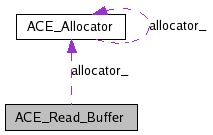ACE_Read_Buffer Class Reference
Efficiently reads an artibrarily large buffer from an input stream up to and including a termination character. Also performs search/replace on single occurrences a character in the buffer using the principles of Integrated Layer Processing. More...
#include <Read_Buffer.h>

Public Member Functions | |
| ACE_Read_Buffer (FILE *fp, bool close_on_delete=false, ACE_Allocator *=0) | |
| Read from a FILE *. | |
| ACE_Read_Buffer (ACE_HANDLE handle, bool close_on_delete=false, ACE_Allocator *=0) | |
| Read from an open HANDLE. | |
| ~ACE_Read_Buffer (void) | |
| Closes the FILE *. | |
| char * | read (int terminator=EOF, int search= '\n', int replace= '\0') |
| size_t | replaced (void) const |
Returns the number of characters replaced during a read. | |
| size_t | size (void) const |
| ACE_Allocator * | alloc (void) const |
| Returns a pointer to its allocator. | |
| void | dump (void) const |
| Dump the state of the object. | |
Private Member Functions | |
| void | operator= (const ACE_Read_Buffer &) |
| ACE_Read_Buffer (const ACE_Read_Buffer &) | |
| char * | rec_read (int term, int search, int replace) |
| Recursive helper method that does the work... | |
Private Attributes | |
| size_t | size_ |
| The total number of characters in the buffer. | |
| size_t | occurrences_ |
| The total number of characters replaced. | |
| FILE * | stream_ |
| The stream we are reading from. | |
| bool const | close_on_delete_ |
| ACE_Allocator * | allocator_ |
| Pointer to the allocator. | |
Detailed Description
Efficiently reads an artibrarily large buffer from an input stream up to and including a termination character. Also performs search/replace on single occurrences a character in the buffer using the principles of Integrated Layer Processing.This implementation is optimized to do a single dynamic allocation and make only one copy of the data. It uses recursion and the run-time stack to accomplish this efficiently.
Constructor & Destructor Documentation
| ACE_Read_Buffer::ACE_Read_Buffer | ( | FILE * | fp, | |
| bool | close_on_delete = false, |
|||
| ACE_Allocator * | alloc = 0 | |||
| ) |
Read from a FILE *.
| ACE_Read_Buffer::ACE_Read_Buffer | ( | ACE_HANDLE | handle, | |
| bool | close_on_delete = false, |
|||
| ACE_Allocator * | alloc = 0 | |||
| ) |
Read from an open HANDLE.
| ACE_Read_Buffer::~ACE_Read_Buffer | ( | void | ) |
Closes the FILE *.
| ACE_Read_Buffer::ACE_Read_Buffer | ( | const ACE_Read_Buffer & | ) | [private] |
Member Function Documentation
| char * ACE_Read_Buffer::read | ( | int | terminator = EOF, |
|
| int | search = '\n', |
|||
| int | replace = '\0' | |||
| ) |
Returns a pointer dynamically allocated with ACE_Allocator::malloc to data from the input stream up to (and including) the terminator. If search is >= 0 then all occurrences of the search value are substituted with the replace value. The last of the byte of data is a 0, so that strlen can be used on it. The caller is responsible for freeing the pointer returned from this method using the ACE_Allocator::free.
| ACE_INLINE size_t ACE_Read_Buffer::replaced | ( | void | ) | const |
Returns the number of characters replaced during a read.
| ACE_BEGIN_VERSIONED_NAMESPACE_DECL ACE_INLINE size_t ACE_Read_Buffer::size | ( | void | ) | const |
Returns the size of the allocated buffer obtained during a read, not including the null terminator.
| ACE_INLINE ACE_Allocator * ACE_Read_Buffer::alloc | ( | void | ) | const |
Returns a pointer to its allocator.
| ACE_BEGIN_VERSIONED_NAMESPACE_DECL void ACE_Read_Buffer::dump | ( | void | ) | const |
Dump the state of the object.
| void ACE_Read_Buffer::operator= | ( | const ACE_Read_Buffer & | ) | [private] |
| char * ACE_Read_Buffer::rec_read | ( | int | term, | |
| int | search, | |||
| int | replace | |||
| ) | [private] |
Recursive helper method that does the work...
Member Data Documentation
size_t ACE_Read_Buffer::size_ [private] |
The total number of characters in the buffer.
size_t ACE_Read_Buffer::occurrences_ [private] |
The total number of characters replaced.
FILE* ACE_Read_Buffer::stream_ [private] |
The stream we are reading from.
bool const ACE_Read_Buffer::close_on_delete_ [private] |
Keeps track of whether we should close the FILE in the destructor.
ACE_Allocator* ACE_Read_Buffer::allocator_ [private] |
Pointer to the allocator.
The documentation for this class was generated from the following files:
 1.5.5
1.5.5